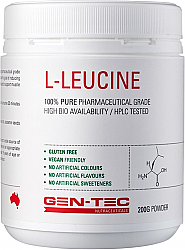L Leucine Supplements
-
Price 0
-
Brand 0
-
Category
- Leucine (1)
- Amino Acids (40)
- BCAAs (29)
- Intra-Workouts (28)
- Essential Amino Acids (18)
- Post-Workout Recovery (15)
- Amino Acid Blends (12)
- Nitrix Oxide Supplements (12)
- Beta Alanine (4)
- Glutamine (4)
- L-Arginine (3)
- Lysine (2)
- Optimum Nutrition (1)
- Scivation (1)
- Scivation (1)
- Tyrosine (1)
- Show more [+]
About L Leucine Supplements
L-Leucine is an essential amino acid that is one of the branched chain amino acids, along with L-Isoleucine and L-Valine. In case you're curious, The "L" before "leucine" refers to the isomer. There are two different isomers of each amino acid that exist in nature. For instance, there are tiny amounts of D-leucine found in the human body, which is a mirror-image of L-Leucine. L-Leucine and D-Leucine have the same chemistry, though slightly different in form and function in the human body. The majority of the research into leucine is based on the L-isomer, and this isomer should therefore be used for supplementation purposes. D-leucine supplements are typically not available to the public and are used for research purposes only.
L-Leucine has some very specific uses, such as improving the anabolic effects of protein consumption and helping overcome the anabolic resistance and muscle losses that come with advancing age. It has been known for years now that L-Leucine stimulates mammalian target of rapamycin (mTOR), which is one of the identified triggers for muscle growth. However, research indicates that all of the building blocks of muscle protein are needed in order for the mTOR trigger to lead to appreciable growth. Taking leucine alone and expecting results could be compared to boosting motivation in a bricklayer and providing only one of many required building materials.
To build a house, many different materials are needed. So to, muscle tissue needs eight of the nine essential amino acids to lay down new protein in addition to many non-essential amino acids. Fortunately, non-essential amino acids are recycled quite well from muscle catabolism and need not be worried about too much, unless growth is extremely rapid. The essential amino acids required for muscle protein synthesis are: isoleucine, leucine, valine, phenylalanine, methionine, lysine, histidine and threonine. Tryptophan, the ninth essential amino acid, is not used directly for muscle building, though it is very important for brain and gut health and should be taken with the other essential amino acids as a team.
L-Leucine may be taken with main meals, protein shakes or amino acid formulations. As little as half a teaspoon of pure powder is all that is needed to help overcome the muscle's reduced responsiveness to this amino acid that comes with advanced age. This may be one of the reasons why anabolic resistance develops. Scientific research has demonstrated that the lack of anabolic response to ingestion of essential amino acids is not due to poor circulation or digestion, and more to do with the muscle cell's ability to utilise the amino acids that are present in circulation. A strong case has also been made for the muscle cell having difficulty in up-taking leucine (and lysine as well).
Early research by Dr Robert Wolfe indicated the ability of leucine-fortified amino acid blends in overcoming anabolic resistance. Research published in 2012 in The Journal of Physiology showed that a tiny 6.25 gram dose of whey protein fortified with leucine triggered as much muscle protein synthesis as 25 grams of whey protein, which was a fascinating finding. This suggests that if the occasional meal is low in quality protein, a leucine dose might help to make up the difference. However, it is best stick to complete whey protein supplements, at proper dosages, until further research is undertaken on this subject. One study can never re-write the book on anything—it needs to be contemplated, hypothesized, reassessed and scrutinised before it can be etched into scientific stone.






